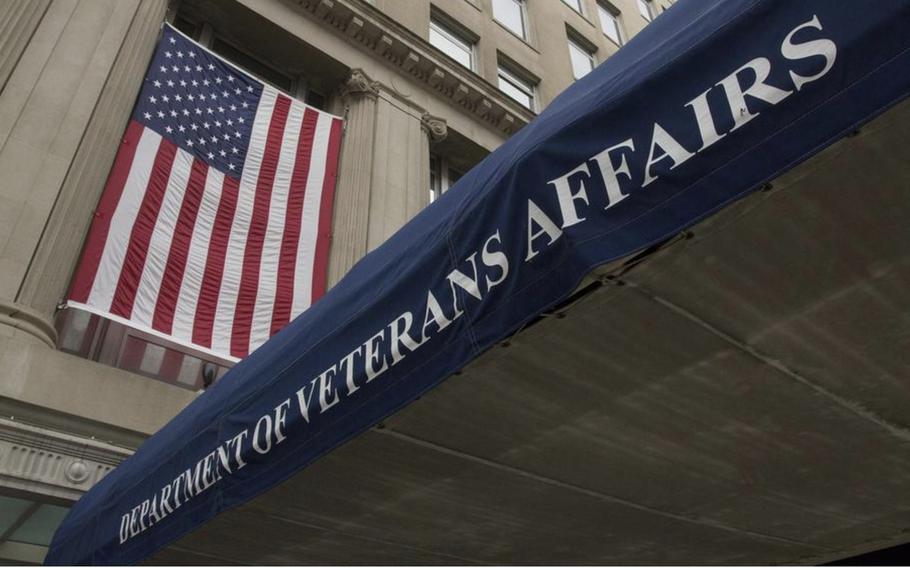
The Department of Veterans Affairs building in Washington. (Stars and Stripes)
It’s Memorial Day in America — a moment of remembrance observed since after the Civil War for those U.S. military personnel who made the ultimate sacrifice to defend our fundamental freedoms.
Yet in that same spirit of eternal gratitude, we also must acknowledge the ways our nation’s government — and politicians from both parties — continue to neglect surviving combat veterans, especially with regard to the rule of law.
Nowhere are these shortcomings more apparent than in the Department of Veterans Affairs’ disability claims process — a daunting, legally complex ordeal for countless veterans struggling to make ends meet.
A veteran whose disability benefits are denied by the VA waits, on average, more than five and a half years for the Board of Veterans’ Appeals to resolve their claim. This delay in process equates to a delay in justice. The due process clause found in the U.S. Constitution’s Fifth Amendment says clearly that no one shall be “deprived of life, liberty or property without due process of law.” We are depriving these volunteer warriors the process required to reclaim their lives after the theater of war — to provide for their families and to receive the assistance they deserve.
Even more troubling, in March, the executive branch unveiled a new plan that threatens to further delay veterans’ bids for benefits and prolong their pursuit of justice; the VA now seeks to slash more than 80,000 jobs at the agency, a workforce reduction of over 17%.
This is far from the first time a president has failed America’s veterans by pursuing broad VA staffing cuts. The previous administration also came under fire last year for its efforts to eliminate 10,000 full-time agency employees — including frontline staff such as psychologists and clinical social workers. The decades prior saw similar requests for VA cuts or reductions by administrations of both parties — often to further other executive priorities.
One sliver of hope is in the hiring of additional judges, attorneys and staff in recent years. As a result, the number of pending appeals has decreased during each of the past two years, while wait times — which peaked last year — have begun to diminish as well.
Regrettably, any downsizing at the VA would imperil whatever small gains the agency has achieved in speeding up its claims process. Those staffing reductions are certain to result in fewer appeals being heard and longer waiting periods for veterans.
Historically, most press coverage of VA cuts has focused on their dangerous repercussions for veterans’ health care, and rightfully so. The Veterans Health Administration serves more than 9 million enrolled veterans across 170 medical centers and 1,200 outpatient clinics.
But a less discussed, more insidious consequence of any resource reduction will be a rapid deterioration of the disability claims process — and with it, an erosion of veterans’ basic legal rights. The backlog of veterans’ disability claims already rests at roughly 200,000 cases, and the latest staffing cuts — set to take effect by August — could rob the VA of the legal professionals and government workers required to conduct hearings and settle disputes.
At the heart of this debate lies the old legal maxim: Justice delayed is justice denied. America’s veterans should be able to count on speedy resolutions to their cases, and they must have confidence in the government’s ability to adjudicate claims in a timely manner.
America’s lawyers, representing veterans on a pro bono basis, can and should play a crucial role in mitigating this crisis. Now more than ever, attorneys have a duty to step into the breach by helping desperate military families finally obtain the benefits they deserve.
Abraham Lincoln spoke of this sacred responsibility in his second inaugural address, urging Americans “to care for him who shall have borne the battle, and for his widow, and his orphan.” These words are etched into the facade of the VA headquarters building itself — a reminder of our highest priority as a nation to care for our veterans, their families, caretakers, and survivors. We owe them the freedom from worry.
Richard H. Deane Jr. is the 75th president of the American College of Trial Lawyers. Founded in 1950, the college is dedicated to maintaining and improving the standards of trial practice, especially trial advocacy, the administration of justice and the ethics of the profession. Since 2007, ACTL has been working to address the delays veterans face when appealing VA denials of disability claims.